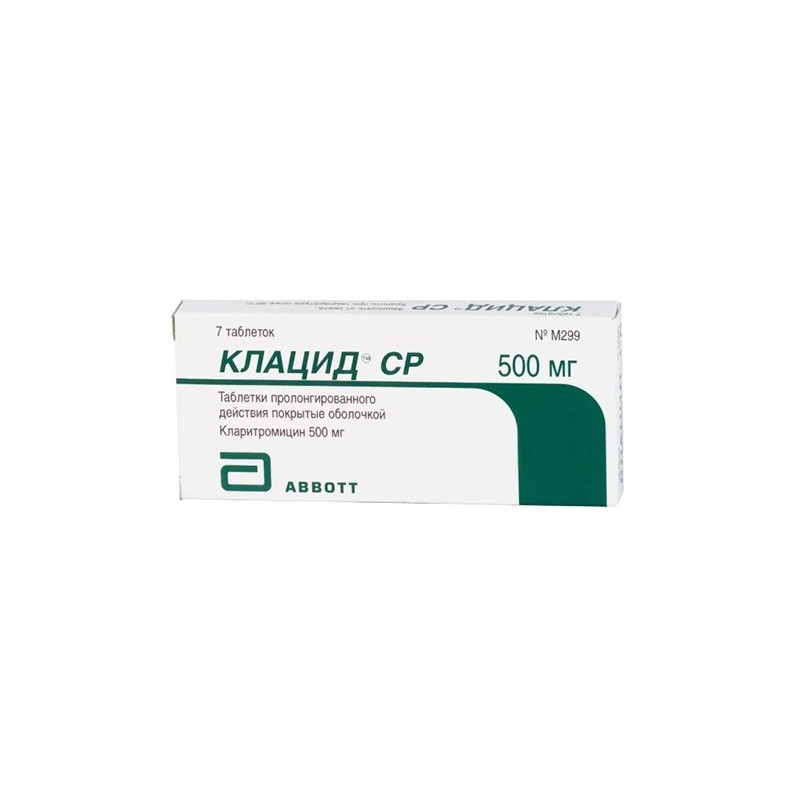



 All payments are encrypted via SSL
All payments are encrypted via SSL
 Full Refund if you haven't received your order
Full Refund if you haven't received your order
Klacid CP pills yellow, oval; two layers are visible on the cross-section: the core is almost white, surrounded by a yellow film.
1 pill contains Clarithromycin 500 mg;
Excipients: citric acid anhydrous hydrogen phosphate, sodium alginate, sodium Calcium alginate, lactose, povidone K30, talc, stearic acid, Magnesium stearate;
shell composition: hypromellose, polyethylene glycol 400, polyethylene glycol 8000, titanium dioxide, dye yellow quinoline (Е104), sorbic acid;
in the blister 5, 7, 10 or 14 pcs., in a box of 1 or 2 blisters.
Klacid is an antibiotic of macrolide group. Clarithromycin inhibits protein synthesis in the microbial cell by interacting with the 50S ribosomal subunit of bacteria. Highly active against a wide range of aerobic, anaerobic, gram-positive and gram-negative bacteria.
Clarithromycin has demonstrated high in vitro activity against standard and isolated bacterial cultures. Highly effective against many aerobic and anaerobic gram-positive and gram-negative microorganisms. In vitro studies confirm the high efficacy of clarithromycin against Legionella pneumophila and Mycoplasma pneumoniae.
Drug also active against aerobic gram-positive microorganisms: Staphylococcus aureus, Streptococcus pneumoniae, Streptococcus pyogenes, Listeria monocytogenes; aerobic gram-negative microorganisms: Haemophilus influenzae, Haemophilus parainftuenzae, Moraxella catarrhalis, Neisseria gonorrhoeae; other microorganisms: Mycoplasma pneumoniae, Chlamydia pneumoniae (TWAR), Chlamydia trachomatis, Mycobacterium Mycobacterium leprae, Mycobacterium kansasii, Mycobacterium chelonae, Mycobacterium fortuitum, Mycobacterium avium complex (Maccoterium chelonae chelonae, Mycobacterium fortuitum, Mycobacterium leprae, Mycobacterium chelonae, Mycobacterium leprae, Mycobacterium leprae, Mycobacterium pneumoniae, Mycobacterium, Mycobacterium, Mycobacterium, Mycobacterium, Mycobacterium, Mycobacterium, Mycobacterium, Mycobacterium, Mycobacterium, Mycobacterium
To clarithromycin insensitive Enterobacteriaceae, Pseudomonas spp., As well as other gram-negative bacteria that do not decompose lactose.
The production of b-lactamase does not affect the activity of clarithromycin. Most of the methicillin and oxacillin resistant staphylococci strains are resistant to clarithromycin.
Clarithromycin has an in vitro effect on most strains of the following microorganisms (however, the safety and efficacy of using clarithromycin in clinical practice has not been confirmed by clinical studies, and the practical significance remains unclear): aerobic gram-positive microorganisms: Streptococcus agalactiae, streptococci (groups C, F, G), Streptococcus group Viridans; aerobic gram-negative microorganisms: Bordeteila pertussis, Pasteurella multocida; anaerobic gram-positive microorganisms: Сlostridium perfringens, Peptococcus niger, Propionibacterium acnes; anaerobic gram-negative microorganisms: Bacteroides melaninogenicus; Borrelia burgdorferi, Treponema pallidum, Campylobacter jejuni.
The microbiological activity of the metabolite is the same as that of the original substance, or 1-2 times weaker with respect to most microorganisms. An exception is Haemophilus influenzae, for which the efficiency of the metabolite is 2 times higher. The parent substance and its main metabolite have either an additive or a synergistic effect on Haemophilus influenzae in vitro and in vivo, depending on the bacterial culture.
Tablets of prolonged action are a homogeneous crystalline base, with the passage of which through the gastrointestinal tract provides a long-term release of the active substance.
Infectious and inflammatory diseases caused by microorganisms sensitive to the drug:
- infections of the upper respiratory tract (pharyngitis, tonsillitis and sinusitis);
- infections of the lower respiratory tract (bronchitis, pneumonia);
- otitis media;
- infections of the skin and soft tissues (impetigo, folliculitis, cellulitis, abscesses);
- disseminated or localized mycobacterial infections caused by Mycobacterium avium or Mycobacterium intracellulare;
- localized infections caused by Mycobacterium fortuitum, Mycobacterium kansasii, Mycobacterium chelonae.
- pronounced renal dysfunction (with CC less than 30 ml / min); these patients are prescribed quick-release clarithromycin;
- simultaneous reception of astemizol, cisapride, pimozide, terfenadine;
- porphyria;
- pregnancy;
- lactation (breastfeeding);
- Hypersensitivity to macrolide antibiotics.
CLACIDE CP is prescribed for adults 500 mg (1 tab.) 1 time / day.
For severe infections The dose is increased to 1 g (2 tab.) 1 time / day.
In patients with renal failureat QC less than 30 ml / min, the dose should be reduced by 2 times. The maximum duration of the course in patients of this group should be no more than 14 days.
pills should be taken with food, swallowing whole, not breaking and not chewing.
Side effect
Cardiovascular: rarely, ventricular arrhythmia, including ventricular tachycardia (with an increase in the QT interval).
Gastrointestinal: nausea, abdominal pain, vomiting, diarrhea, gastralgia, pancreatitis, glossitis, stomatitis, oral candidiasis, discoloration of the tongue and teeth; rarely - pseudomembranous enterocolitis. Teeth discoloration is reversible and is usually restored by professional cleaning by a dentist. Liver dysfunction was rarely observed, incl. increased liver enzyme activity, hepatic cell and / or cholestatic hepatitis with or without jaundice. These abnormal liver functions can be severe, but usually they are reversible. Very rarely, there have been cases of liver failure and death mainly due to severe concomitant diseases and / or concomitant drug therapy.
From the side of the central nervous system: transient headaches, dizziness, anxiety, insomnia, nightmares, tinnitus, depersonalization, hallucinations, convulsions, fear; rarely - psychosis, confusion; in some cases, hearing loss (with the discontinuation of clarithromycin, hearing was restored), a change in smell (usually accompanied by distortion of taste sensations).
Allergic reactions: urticaria, skin flushing, pruritus, anaphylaxis, Stevens-Johnson syndrome.
Hemic and lymphatic: leukopenia, thrombocytopenia.
From the laboratory indicators: increased creatinine levels in the blood; rarely - hypoglycemia (while taking hypoglycemic drugs).
Other: development of microbial resistance.
To store in protected from light, the place, inaccessible for children, at a temperature not above 30 ° C.
Klacid sr